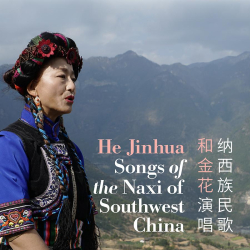Songs of the Naxi of Southwest China to be released March 11th on Folkways
First collection of Naxi folk songs to ever be released outside China

Pre-order HERE
Listen to the official audio sampler HERE
Songs of the Naxi of Southwest China, an album documenting the traditional music of the Naxi people of China and sung by the renowned Naxi vocalist He Jinhua, will be released March 11th on Smithsonian Folkways Recordings. A wide-ranging collection tethered to He’s entrancing, often multi-layered a cappella performances, the collection marks the first time that folk songs of the Naxi people, of whom there are only about 320,000 in the world, have been shared outside China.
Conceived by He Jinhua as a way to help preserve and pass on the traditional songs of the Naxi people in the Naxi language, Songs of the Naxi is a collection of folk songs from northwest Yunnan province. As in the rest of China, local Naxi performing arts suffered setbacks during the Cultural Revolution of 1966–1976, and later through the influx of modern media and pop music in the 1980s. Since then, culture-bearers, scholars, and officials have made a strong effort to revive traditions, but the astounding variety of folk songs and styles honed by this small group has never before been available for outsiders to listen to.
Naxi folk songs are full of references to snow-clad mountains, rushing rivers, spring flowers, and the profusion of local wildlife in the Naxi heartland. They speak of daily life - of agricultural labor, or the sorrow of a bride’s mother at her daughter’s departure, but also of the joy of communal celebrations, and the fun that children can find in everyday activities - and reflect the uniqueness of the community. A Tibeto-Burman ethnic group concentrated in Lijiang, the Naxi live close to other ethnic groups, such as Tibetans, Lisu, Yi, Bai, and Han Chinese (China’s ethnic majority), and have fostered a specific yet intermingled, intermarried, and mixed-religion culture that has endured in part due to the rural lifestyle in the region and, until the 1990s, its geographical isolation.
He Jinhua is a national first-level artist with the Yulong County Song and Dance Troupe of Lijiang. The daughter of farmers, He was invited to the county seat to perform with the troupe as a teenager in 1986, and never left. Since then, she has achieved the rare distinction of the title of Chinese National First-grade Performer; received a silver medal in the 2008 Chinese Central Television Young Singers Competition, a gold medal at the 2010 China Arts Festival, and other recognition. She has also performed at the Smithsonian Folklife Festival in the US.
For Songs of the Naxi, He provides vocals and even came up with two original compositions, played on the Naxi jaw harp, that might sound psychedelic to Western ears. She also worked with GRAMMY-winning composer Daniel Ho to adapt two songs, which Ho set to piano and ‘ukulele/recorder accompaniment (“Transplanting Song” and “Gguqqil from Labeq,” respectively). For the liner notes and materials, she worked with Naxi studies expert Professor Yang Fuquan (former Deputy Director, Yunnan Academy of Social Sciences) and Professor Helen Rees (UCLA Department of Ethnomusicology) on both translations from Naxi into Chinese and English, and the photography (by Rees).
Of Songs of the Naxi, He Jinhua says: "I'm honored to have been able to work with such a renowned record company. I feel that it is a matter of urgency to preserve the longstanding culture I have studied all these years, as the elders who can still sing these songs are already leaving us."
Yang Fuquan added: “The publication by Smithsonian Folkways of Jinhua's CD will increase global awareness of Naxi traditional music as well as bringing an outstanding Naxi folksinger to international notice.”
And Helen Rees said: “The range of songs on this CD is extraordinary: not just Naxi songs from Jinhua's home area, but also Tibetan songs from that same area, and songs she has learned from all over the Naxi heartland.”
For more information on Smithsonian Folkways, contact Hannah Schwartz (hschwartz@shorefire.com) or Kelly Sheng (ksheng@shorefire.com).
